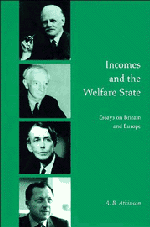Book contents
- Frontmatter
- Contents
- List of figures
- List of tables
- Preface
- Introduction
- I Income inequality and poverty in Britain and Europe
- II Analysis of the Welfare State
- 6 Is the Welfare State necessarily a barrier to economic growth?
- 7 A national minimum? A history of ambiguity in the determination of benefit scales in Britain
- 8 The development of state pensions in the United Kingdom
- 9 Income maintenance for the unemployed in Britain and the response to high unemployment
- 10 Institutional features of unemployment insurance and the working of the labour market
- 11 Social insurance
- III Targeting and the future of social security policy
- Notes
- Bibliography
- Name index
- Subject index
10 - Institutional features of unemployment insurance and the working of the labour market
Published online by Cambridge University Press: 03 May 2011
- Frontmatter
- Contents
- List of figures
- List of tables
- Preface
- Introduction
- I Income inequality and poverty in Britain and Europe
- II Analysis of the Welfare State
- 6 Is the Welfare State necessarily a barrier to economic growth?
- 7 A national minimum? A history of ambiguity in the determination of benefit scales in Britain
- 8 The development of state pensions in the United Kingdom
- 9 Income maintenance for the unemployed in Britain and the response to high unemployment
- 10 Institutional features of unemployment insurance and the working of the labour market
- 11 Social insurance
- III Targeting and the future of social security policy
- Notes
- Bibliography
- Name index
- Subject index
Summary
The principal theme of this chapter is that much of the theoretical literature dealing with the relationship between benefit and unemployment fails to capture the essential institutional features of unemployment insurance. The literature – with some notable exceptions – has ignored important aspects of how benefits actually operate in the real world. As a result, the conclusions reached may be misleading. It is not adequate to treat unemployment insurance as simply wages received when not in work. One has to consider the conditions under which benefits are paid, their link to labour market decisions, the contributory basis of unemployment insurance, and the limited duration of insurance benefit.
The first section (10.1) describes certain key institutional features of unemployment insurance, distinguishing it from unemployment assistance and from general welfare benefits. Among the most important aspects are that claimants may be disqualified from unemployment insurance if they have quit voluntarily or been dismissed for industrial misconduct, that entitlement to benefit depends on the past record of insured employment, and that there is a limited duration of benefit. These features are illustrated by reference to the social security systems of the United States and the United Kingdom. Section 10.2 considers how far these institutional features have been modelled in a selection of contributions to the theoretical literature on unemployment benefits and the labour market. The third section concentrates on a model of a dual labour market model with efficiency wages related to the need to induce workers to apply effort, and imperfect matching of unemployed workers and vacancies, coupled with queue unemployment.
- Type
- Chapter
- Information
- Incomes and the Welfare StateEssays on Britain and Europe, pp. 184 - 204Publisher: Cambridge University PressPrint publication year: 1996
- 2
- Cited by



